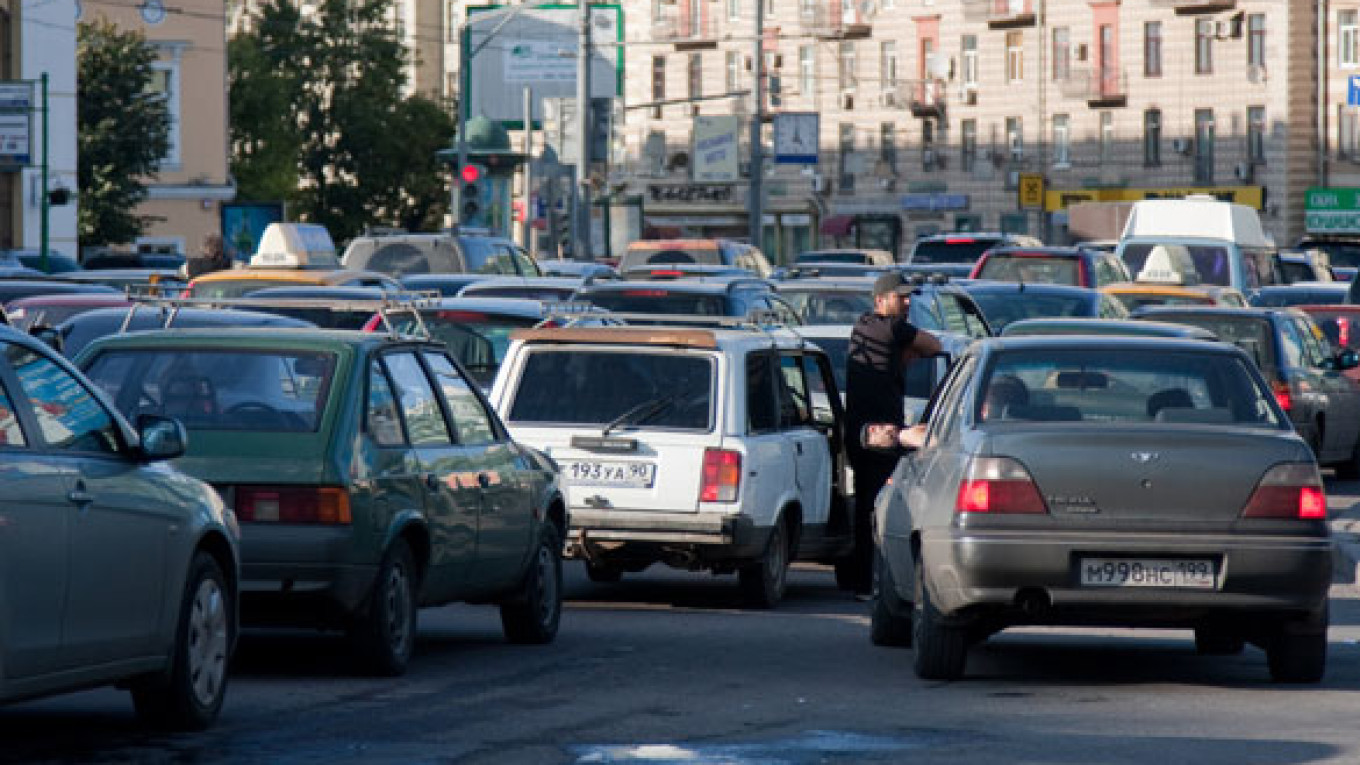Mayor Sergei Sobyanin announced Thursday that he would fight Moscow's notorious traffic jams by creating new parking, developing public transportation and constructing new roads.
Sobyanin toured the city's worst-jammed areas over the 36 hours before announcing that he was taking his first steps to tackle a problem that President Dmitry Medvedev has identified as a top priority.
Leading driver rights activist Vyacheslav Lysakov praised Sobyanin's measures but cautioned that proper implementation would be needed to free up traffic.
Sobyanin and other senior city officials discussed traffic at a meeting with Medvedev at the Gorki presidential residence.
“The number of traffic jams influences the mood of not only millions of Muscovites but also a huge number of people visiting the capital,” Medvedev said in televised remarks.
He said a difficult but solvable task awaited Sobyanin.
Sobyanin laid out his plans ahead of the meeting.
“First of all, we need to direct money and resources to create normal conditions allowing people to park,” he said, noting that now drivers often have to double park.
But parking lots should not be free, he said on Rossia One television.
Improving the public transport system will be the second part of the strategy, followed by the construction of more roads, Sobyanin said.
At a closed City Hall meeting Wednesday, Sobyanin said separate lanes should be allotted for public transportation, RIA-Novosti reported, citing an unidentified city official.
At the meeting with Medvedev, Sobyanin also said city authorities would raze about 600 small buildings and kiosks illegally constructed along city streets that contribute to traffic congestion.
City Hall will cooperate with Moscow regional authorities and the federal government on traffic problems, he said at the meeting, which was attended by the region's top transportation official, Pyotr Katsyv.
Sobyanin on Wednesday toured some of the busiest downtown routes, including the Garden Ring and Boulevard Ring, and surveyed the perpetual traffic jam near Belorusskaya Ploshchad, half-blocked by construction work, from the roof of an office building.
He continued the inspections Thursday by visiting Komsomolskaya Ploshchad, the site of three major train stations and semi-improvised terminals for cross-country buses.
But Moscow jams will grow worse because the number of cars is growing and will top 1 million by January, said the country's top traffic police officer, Viktor Kiryanov, Interfax reported.
Lysakov, who heads the Svoboda Vybora motorists movement, said Sobyanin would have to dismantle the decision-making system left by his predecessor, Yury Luzhkov, to succeed.
“Individual measures can't change anything. A coherent strategy is needed to make progress,” Lysakov said by telephone.
“New decisions must be transparent so experts can analyze them, and they shouldn't be made behind the scenes like they used to be,” he said.
Sobyanin has not confirmed who will work in City Hall's transportation department. Acting head Vasily Kichedzhi was neither dismissed nor confirmed to his post when the mayor appointed his government earlier this week.
But Sobyanin also appointed the city's first-ever deputy mayor responsible for traffic and road development, plucking Nikolai Lyamov, 59, from the federal Transportation Ministry, where he served as a deputy minister. Lyamov headed a Cossacks committee in Rostov-on-Don before getting the federal job.
It remains unclear how traffic-related duties will be split within City Hall. Lyamov used to oversee traffic safety in the federal Cabinet. Kichedzhi was mostly responsible for public transportation, and road construction was in the hands of then-Deputy Mayor Vladimir Resin, now Sobyanin's first deputy mayor in charge of economic policy.
A Message from The Moscow Times:
Dear readers,
We are facing unprecedented challenges. Russia's Prosecutor General's Office has designated The Moscow Times as an "undesirable" organization, criminalizing our work and putting our staff at risk of prosecution. This follows our earlier unjust labeling as a "foreign agent."
These actions are direct attempts to silence independent journalism in Russia. The authorities claim our work "discredits the decisions of the Russian leadership." We see things differently: we strive to provide accurate, unbiased reporting on Russia.
We, the journalists of The Moscow Times, refuse to be silenced. But to continue our work, we need your help.
Your support, no matter how small, makes a world of difference. If you can, please support us monthly starting from just $2. It's quick to set up, and every contribution makes a significant impact.
By supporting The Moscow Times, you're defending open, independent journalism in the face of repression. Thank you for standing with us.
Remind me later.


